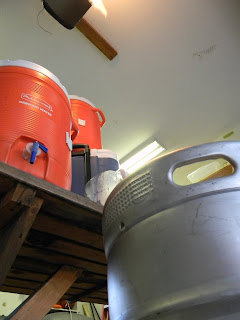Jesus "Ryes Us
I brewed my first all-grain brew today and it was a blast! Taking it out of the kitchen throws brewing into a whole new dynamic for me. I was able to have the space I needed and the ability to clean up as I would in a real brewery, with a hose. I started by cleaning my new keggle by heating up water on the propane burner and then adding a few tablespoons of PBW into solution. I then drained that into my fermenters to set for a while. After rinsing the keggle I heated up 7.5 gallons of water to 160F and then transfered into my mash tun. I then added the grains and let sit for about an hour. The temp from beginning to end stayed exactly at 150 F, which is amazing in my opinion.
Water
start with 13 gallons of water, to end with 8 gallons in the fermenters. The water was left out for a few hours to try and evaporate the chlorine. The original pH is 5.
Grainbill
14 lbs of 2 row base malt
1 lb of crystal 10L
1 lb of crystal 20L
0.5 lb of crystal 40L
2 lb of malted rye
7.3 Lovibond
Hops
2 oz of Golding, 5.7AA @ 60 min
2 oz of Amarillo, 11.2AA @ 20 min
2 oz of Saaz, 3.2AA @ 5 min
Two Yeast strains into two different fermenters both with 4 gallons in them:
American Ale 2
Belgian witbier
No adjuncts
Irish moss at 15 minutes
I performed an Iodine test to check for saccharification by draining a few drops of wort into a plastic tupperware container and then setting into a dish of cold water to cool down. Iodine turns black in the presence of starch, so if there is no color change then your enzymes have successfully converted all the starch into sugar. At first the iodine turned light red, so I let the mash keep going for a few more minutes and checked again. When I did my final test there was no color change so it was time to vorlouf. I did this by slowly draining the wort into a pitcher and slowly pouring it back on top of the mash.
The next step is sparging the grains. I heated up 5.5 gallons of water to 175F and then transfered into the HLT which was elevated above the mash tun. Drained the wort into the keggle until there was about a half inch of wort still present on above the grains, then it was time to start the sparge. I was left with 12.5 gallons of wort in the keggle.
From here it is all the same as before. only I boiled eight gallons instead of two.
It took only about an hour to reduce from 212 F to 70F
And we WAIT..........
We had a bit of a mistake when it came to emptying the keggle into the fermentors, the moral of the story here is that you should always check your spigots and fittings. I did not check the o-ring on my hop strainer in the keggle, it fell apart and got clogged, and then the spigot I chose for one of my fermentors fell off leaking a bit of wort on the ground. All in all it was the best brew ever and I feel much more confident in my skills and in what I have learned from the world brewing academy. I could feel what was taught to me being properly used.








No comments:
Post a Comment